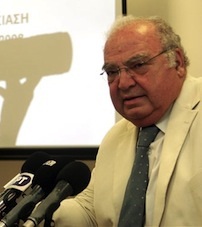Chaos and corruption reign all around the Greek public sector, show data from the report of the Public Administration Inspector General Leandros Rakidzis. The most common offences are related to bribery and malpractice. The main characters are mostly civil servants or senior tax inspectors with many years of experience and a broad range of activities.
Over 70% of the most serious offences to the detriment of the state are attributed to public  administration staff with over 20-25 years of experience. By the annual control inspection over the functioning of the administration, Rakidzis is drawing the conclusion that the disciplinary sanctions do not meet the severity of the violations or are not applied with sufficient rigour. The second instance cases he inspected last year have increased by 10% compared to 2010.
administration staff with over 20-25 years of experience. By the annual control inspection over the functioning of the administration, Rakidzis is drawing the conclusion that the disciplinary sanctions do not meet the severity of the violations or are not applied with sufficient rigour. The second instance cases he inspected last year have increased by 10% compared to 2010.
The supervisor has found 185 cases in which the administrative penalties for violations at the first instance were inadequately mild to the offences committed. There are still cases of malpractice, which are even increasing in number, despite the ongoing reforms in public administration. One of the most striking cases is in Trikala Municipality, where, for a period of 11 years, payment orders have been issued for the acquittal of fictitious loans to the municipalities of Farkadona and Pialion. The total amount defalcated by the ally is 175,000 euro. The same officer had already been found guilty of misuse of state property in the past, worth 22,000 drachmas, but his punishment then was only six months suspension from office, after which he was appointed to the municipal office. In another case, in Athens, a tax inspector has asked for a 100,000 euro bribe in order not to take into account the tax penalty of a businessman. After the case was discovered, he was dismissed for breach for six months. At the second instance, the punishment was removed.
The list of violations by civil servants is long and varied. A head of the Regional Development Department in the Peloponnese has approved funding worth 230,000 euro for a project of a private company, although it has neither participated in a competition to win the grant, nor has the project been estimated. The same official has approved state co-financing of another company worth 467,000 euro (50% of the project's value) without requiring the full documentation for the funding approval. The generous civil service clerk has been punished with a six-month deprivation of salary, but has not been discharged. Another civil servant of the social security fund IKA got away without penalty. She had issued certificates for correct payment to companies which have never paid social security contributions for their employees. The head of the financial department at the Greek Tourism Organization has been released from disciplinary responsibility even though his actions are proved to have contributed to the financial losses of the institution in 2006-2010.
At the moment, the personal assets and accounts of 60 employees of the Ministry of Economy and Development are being investigated, who were embroiled in a corruption scandal in the key institution. They have approved of the allocation of EU funds, but the co-financing of public-private projects has depended on whether the contractors were willing to give a percentage of the sum to the officials from the ministry.
Meanwhile, the economic police in Greece has released a study according to which 6 in 10 taxpayers commit some kind of tax fraud. Only in the period between 6 and 23 June, special tax authorities across the country made 1410 inspections and found over 22,000 violations in 805 commercial sites in tourist areas. In the municipalities of Zakynthos, Lefkada, Kastoria, Kos, Chania and Thira, each tax audit has established at least one violation. In other words, in these areas, not a single tax honest trader or entrepreneur has been found.